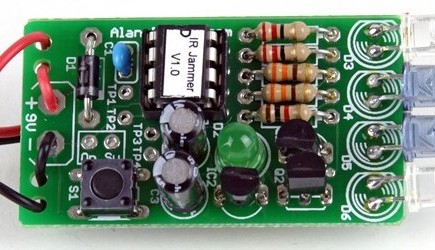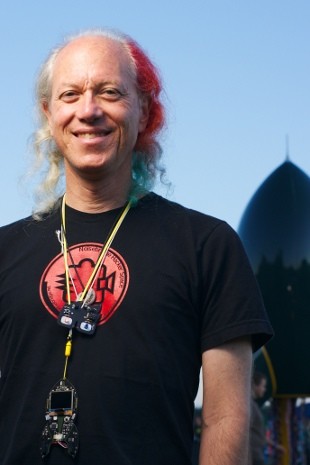Turn Off Your TV and Build Something: An Interview with Mitch Altman
June 12, 2014
on
on

This week I had the pleasure of interviewing a well-known hacker and activist, Mitch Altman. Mitch is so well known among hackers, makers and people of all different walks of life that he almost needs no introduction.
We talked about his impressive work, as well as his goals and outreach to teach many different people of all ages and backgrounds about hacking and DIY culture.

ADG: Who are you? What do people find interesting about your work?
MA: I love what I do. That’s what the primary aspect of everything I do. I do everything that I love it. Doing meaningful things with my time.
ADG: What was your first big project?
MA: The TV-B-Gone. It was 10 years in the making. During that time, I did jobs I thought were ok, but nothing I ever really loved. TV-B-Gone was my big break. It’s a keychain that turns off TVs, and it’s the only thing I’ve made since 2004 that makes money. [laughter]
ADG: How does it work?
MA: Point it at a TV set, press the button (no need to hold the button down) and keep pointing it at the TV until the TV turns off (which may take up to 69 seconds).
Mitch and his company have worked together with Adafruit Industries to develop a kit version of the TV-B-Gone. Mitch thinks open source kits are awesome!
ADG: How would devices like these get people interested in hacking?
MA: Building and creating is fun! That’s it… Now that I’ve done a TEDX talk in Brussels, more people have found out about hackerspaces and will hopefully come to the hackerspaces and do cool things and spread the joy. Hackerspaces are very wonderful, supportive spaces for people to do what they love.
ADG: You co-found a very groundbreaking hackerspace, Noisebridge. What inspired you to bring hackers together into a space like Noisebridge?
MA: Well, what struck me when I was at the hackerspace design talk at CCC 2007… every time I went, I would feel so joyful… and then it all ends. I didn’t want it to end! But if you have a hackerspace, it can go on forever! My friend Jake Appelbaum was there, and he had the same idea. We started talking about it, and we all decided to do that. We’ve been meeting every Tuesday since 2007.
ADG: I'm going to be a bit blunt and real with you. When people think of a "hacker," they usually have an image of a white, privileged male, they don't usually think of an inner city youth of color. How do we change this?
MA: I definitely want the word hacker to apply to anyone who wants to explore and do what they love. Hacking is for everyone. Hacking is about taking anything that exists in the world as a resource, and changing it and sharing it with people. You can do hacking with science, food, with our-selves, with communities, with societies, with the planet, because everything needs improvement.
There are definitions of hacker that the media has promulgated of some guy breaking into a computer to do malicious things… that’s just criminal. That’s not what is going on at most hackerspaces. Those people aren’t improving anything, or sharing.
We can create supportive communities where everyone is welcome. At Noisebridge we purposefully set out to do that… In order to attract people of all genders, classes and ethnicities we said we are 100 percent intolerant of intolerance. Homophobia, racism, those aren’t ok. We have classes and workshops to attract people to do things that maybe they had preconceived notions of what each ‘gender’ does. Everyone is exposed to everything. There is nothing in the human brain that says “only boys can solder” only girls can push fabric underneath a sewing machine.”
At Noisebridge we have been encouraging people in our community to use this as a resource. If a teacher wants to use the space to hold a class, they are welcome.
For more information about exciting scientific and hardware projects and collaborations, check out EHSM’s YouTube channel, and the EHSM website.
Image: TV-B-Gone
We talked about his impressive work, as well as his goals and outreach to teach many different people of all ages and backgrounds about hacking and DIY culture.

ADG: Who are you? What do people find interesting about your work?
MA: I love what I do. That’s what the primary aspect of everything I do. I do everything that I love it. Doing meaningful things with my time.
ADG: What was your first big project?
MA: The TV-B-Gone. It was 10 years in the making. During that time, I did jobs I thought were ok, but nothing I ever really loved. TV-B-Gone was my big break. It’s a keychain that turns off TVs, and it’s the only thing I’ve made since 2004 that makes money. [laughter]
ADG: How does it work?
MA: Point it at a TV set, press the button (no need to hold the button down) and keep pointing it at the TV until the TV turns off (which may take up to 69 seconds).
Mitch and his company have worked together with Adafruit Industries to develop a kit version of the TV-B-Gone. Mitch thinks open source kits are awesome!
ADG: How would devices like these get people interested in hacking?
MA: Building and creating is fun! That’s it… Now that I’ve done a TEDX talk in Brussels, more people have found out about hackerspaces and will hopefully come to the hackerspaces and do cool things and spread the joy. Hackerspaces are very wonderful, supportive spaces for people to do what they love.
ADG: You co-found a very groundbreaking hackerspace, Noisebridge. What inspired you to bring hackers together into a space like Noisebridge?
MA: Well, what struck me when I was at the hackerspace design talk at CCC 2007… every time I went, I would feel so joyful… and then it all ends. I didn’t want it to end! But if you have a hackerspace, it can go on forever! My friend Jake Appelbaum was there, and he had the same idea. We started talking about it, and we all decided to do that. We’ve been meeting every Tuesday since 2007.
ADG: I'm going to be a bit blunt and real with you. When people think of a "hacker," they usually have an image of a white, privileged male, they don't usually think of an inner city youth of color. How do we change this?
MA: I definitely want the word hacker to apply to anyone who wants to explore and do what they love. Hacking is for everyone. Hacking is about taking anything that exists in the world as a resource, and changing it and sharing it with people. You can do hacking with science, food, with our-selves, with communities, with societies, with the planet, because everything needs improvement.
There are definitions of hacker that the media has promulgated of some guy breaking into a computer to do malicious things… that’s just criminal. That’s not what is going on at most hackerspaces. Those people aren’t improving anything, or sharing.
We can create supportive communities where everyone is welcome. At Noisebridge we purposefully set out to do that… In order to attract people of all genders, classes and ethnicities we said we are 100 percent intolerant of intolerance. Homophobia, racism, those aren’t ok. We have classes and workshops to attract people to do things that maybe they had preconceived notions of what each ‘gender’ does. Everyone is exposed to everything. There is nothing in the human brain that says “only boys can solder” only girls can push fabric underneath a sewing machine.”
At Noisebridge we have been encouraging people in our community to use this as a resource. If a teacher wants to use the space to hold a class, they are welcome.
For more information about exciting scientific and hardware projects and collaborations, check out EHSM’s YouTube channel, and the EHSM website.
Alison Dorantes-Garcia has done a series of interviews with speakers of EHSM (Exceptional Hardware Software Meeting) 2012. The conference explores the outer limits of open source hardware and software. The second edition of EHSM will take place in Hamburg, Germany June 27-29, 2014.
Image: TV-B-Gone
Read full article
Hide full article


Discussion (1 comment)